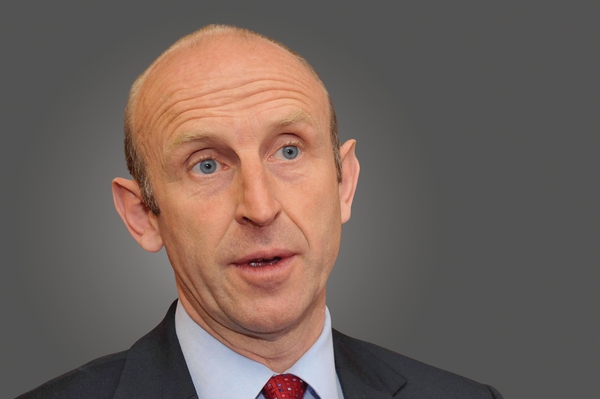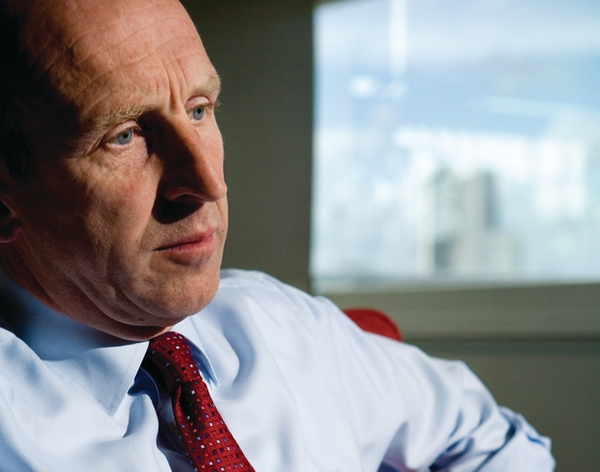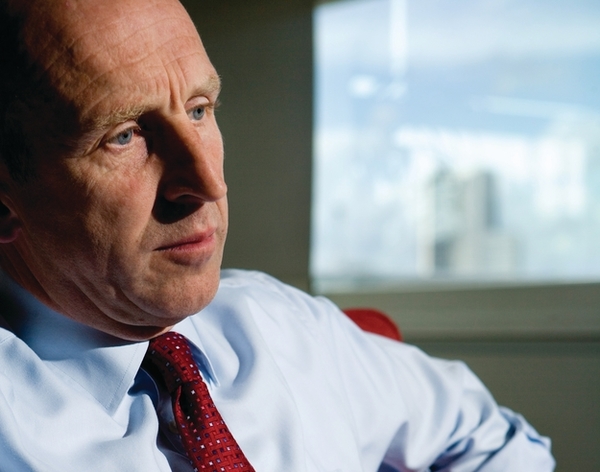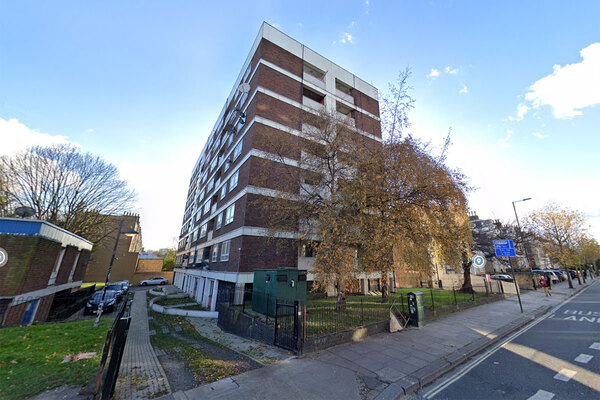You are viewing 1 of your 1 free articles
If the hat fits: John Healey's housing mission
Former Labour housing minister John Healey is on a mission to put housing at the top of the electoral agenda - and don his hard hat and reprise a cabinet housing role. Nick Duxbury meets him

Source: Jonathan Goldberg
A white hard hat hangs from the door of John Healey MP’s Westminster office.
The hat, a souvenir from construction site visits during his 2009 role as Labour housing minister, feels like the elephant in the otherwise sparsely decorated room.
For no obvious reason, it wins right of place alongside a narrow selection of family photos. And despite being adorned with the New Labour slogan ‘a future fair for all’ in bold, red type, there is a sense it speaks less of nostalgia and much more about Mr Healey’s ambitions for the future.
On paper, the 54-year-old MP for Wentworth and Dearne in South Yorkshire should be yesterday’s man as far as housing policy goes.
He was the last of a succession of four housing ministers under the last Labour government. Since then a further four housing ministers and three shadow housing ministers have been and gone under the coalition.
His tenure was short: an 11-month stint in 2009 until the coalition came to power in 2010, after which he served in opposition as shadow health minister before resigning in October 2011 to spend more time with his family.
Secret project
Yet, more than four years after leaving office, he is more actively involved in the sector than ever before. Indeed, Mr Healey has become an unlikely political champion for social housing, leading the formation of lobby group Social Housing Under Threat (Shout), attending industry events and acting as a frequent commentator on housing matters in the press, as well as pushing for reforms to the private rented sector in parliament.
Behind the scenes he has been equally active. In a cramped, airless office next to Mr Healey’s, two young academics are working on a secret project. They are modelling projections for the long-term savings that could be made to the government’s spending on housing benefit by funding the large-scale construction of social rented housing.
They are crunching the numbers to compare this with the impact on spending on housing benefits of using the coalition’s revenue funding, whereby housing associations receive lower grant but charge higher rents. This is intended to provide a basis of evidence on which his party can act.
Inside Housing meets Mr Healey to discover what motivates this politician’s apparent passion for social housing and specifically, why he is still so involved in the sector years after leaving it.
As we find out, Mr Healey has, in large part, been responsible for the reforms that have shaped the housing landscape today and is keen to drive further reforms if Labour wins the next election.

‘John not only has a passion for the subject, but he also has a fascination with the idea that we have got it wrong for decades by spending millions on housing benefit instead of investing in building homes,’ explains Karen Buck, parliamentary private secretary to Labour leader Ed Miliband. ‘He wants to change that.’
Mr Healey’s motivation appears sincere. He speaks slowly and deliberately in long speech-like sentences, but behind the loyal red tie and the cautious veneer, there is a latent fierceness that surfaces on the topic of housing. His cool countenance breaks with flashes of anger when discussing coalition reforms, which he regards as a deliberate, ideological attack on social housing.
He calls for widespread recognition that the coalition policies are viewed ‘not just as a failure to make a commitment to social housing as a feature of modern Conservative thought, but actually a deliberate aim to see it reduced and redundant’.
In particular he is scathing of the revenue model that is used to fund affordable homes for rent at up to 80% of market rates.
‘The concept of affordable housing as the government has now hijacked it is, over a 10-to-20-year period, entirely unsustainable,’ he says.
‘It is not affordable. And in the long run, it is not affordable for the taxpayer either, because we end up paying more, at a higher cost, to build at affordable level rents than we do at social level rents.’ Mr Healey, it seems, is picking up where he left off.
‘I had 11 months in the job before the election. So that left me with a strong sense of unfinished business,’ he admits. ‘I hadn’t expected to be so involved in housing. What I found is you can leave the housing brief behind, but you can’t leave housing behind. It gets under your skin - gets into your soul almost - and that’s why I am still working on it.’

Red ties: Mr Healey has kept his Labour hard hat with its 2009 campaign slogan
Unfinished business for Mr Healey entails encouraging his party to lead a big house building programme as an economic stimulus. He believes the key to change lies with councils. The self-financing reforms to councils’ housing revenue accounts (HRAs) in April 2012, in which councils took on £29bn of debt in return for control over their rental income, were the culmination of a considerable amount of work by Mr Healey.
This was started during his time at the Treasury (see CV) and continued as he negotiated the historic deal as housing minister. Indeed, his one ‘tribute’ to the coalition is that it carried through the reforms. However, he accuses the Treasury of hacking away capacity for ‘at least 50,000’ council homes from the original deal. This, he says, was a result of ‘resetting the discount rate’ used to value social homes, thereby removing ‘headroom’ that had been built into the individual council settlements.
‘We built in headroom because of the discount rate and the terms of the deal for all councils to be able to invest to build,’ he explains. ‘So they took out the capacity for at least 50,000 new council houses from year one out of the deal. But they still did it.’
Now Mr Healey is adamant that the borrowing cap - what he terms an ‘artificial constraint’ - on councils’ housing funding, which was introduced to limit the amount of debt councils could take on, should be lifted, so they have greater capacity to build more homes.
‘Removing the cap is the natural next step from HRA reform.’
However, it is far from certain whether this will be part of Labour’s manifesto. The mood music from the Labour-commissioned Lyons review of housing suggests it might not be, for fear of adding debt to the national balance sheet. Mr Healey points out that the party has said it will not be constrained by the coalition’s capital expenditure plans, and so could make a greater capital investment and allow more borrowing.
‘There is a good common sense case for that, as well as a good economic case. We have to make that argument with confidence.’
Political credit
So will the party listen? Is his work influencing the Labour manifesto policy makers? He smiles.
‘People will have to judge that for themselves. But I am a politician who has always worked across the political breadth of the Labour Party and on a cross-party basis.
‘I got 216 out of 250 votes in the recent election from the parliamentary Labour Party [PLP] to the party National Executive Committee, so I talk a good deal to all my PLP colleagues, front and back.’ He does not mention that, in winning a place on the governing executive, he ousted Labour veteran Dennis Skinner.
Indeed, asked whether he expects a Labour government to fund social rent again, he answers without hesitation: ‘Yes. And I can see - and want to see - a Labour government allowing councils to fund their own house building again.’
Cabinet door
More intriguingly, would he like to be housing minister again?
‘What I want is to see a Labour government after May with a really big programme for housing,’ he replies. ‘Actually, that matters most to me.
‘Part of the work I am doing now is to try to help my party, leading on the housing and economic briefs, to know and be ready from the day after the next election - not just knowing what we want to do, but how we want to do it.’ Quite. But would he like to be the housing minister again?
‘If Labour was in government, then I would like to be in government again. I stepped down from the shadow cabinet because our son was going into sixth form - he is our only child - and I wanted to be at home more than I had been.
‘He has done his A-levels and left home, so if I got the chance again, I would take it. None of that is in my gift, so it’s idle to speculate really.’
While he is evasive about his own plans, Mr Healey is more robust about what the sector should be doing to safeguard its future. In pointing out housing’s reluctance to pick a political scrap, he has become its default figurehead by forming Shout.
‘I have not come across any field or business where you have so many people with such dedication, commitment and expertise, but who are generally so content with conversations among themselves - inward-looking and not getting what is a great track record across to a much wider public and policy-making world,’ he says. ‘It’s a frustration.’
‘The housing sector doesn’t carry its arguments with the power it has the potential to wield - and that is, above all, what I would like to see the sector doing over the next nine months.’
Of course, in the wake of the election at the end of those nine months, if Mr Healey has his way, he will be back in government - maybe even wearing his hard hat again.
John Healey’s CV
1983-1997 Works as a journalist for The House Magazine for a year, a disability rights campaigner and then campaign director with Trades Union Congress
1997 Elected as MP for Wentworth and Dearne
1999-2001 Serves as parliamentary private secretary to chancellor Gordon Brown
2001 Appointed as skills minister until 2002
May 2002 Becomes economic secretary to the Treasury
2005-2007 Becomes financial secretary to the Treasury
June 2007 Appointed minister for local government
May 2009 Replaced Margaret Beckett as housing minister for 11 months
May 2010 Was shadow housing minister until October 2010, when he was made shadow health minister
October 2011 Resigned as shadow health minister for family reasons












